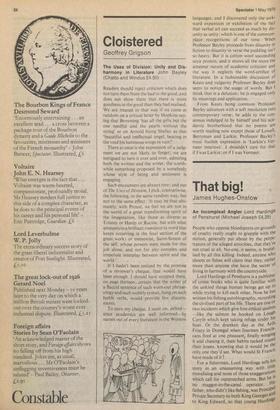Cloistered
Geoffrey Grigson
The Uses of Division: Unity and Disharmony in Literature John Bayley (Chatto and Windus £4.50) Readers should reject criticism which does not turn them from the bad to the good, and does not show them that there is more goodness in the good than they had realised. We are treated in that way if we come at random on a critical letter by Hopkins saying that Browning 'has all the gifts but the one needful and the pearls without the string' or on Arnold fixing Shelley as that 'beautiful and ineffectual angel, beating in the void his luminous wings in vain!'
There at once is the expression of a judgment we are not likely to forget; we are intrigued to turn it over and over, admiring both the written and the writer, the worthwhile something proposed by a somebody whose style of being and sentiment is engaging.
Such encounters are always rare; and out of The Uses of Division. I pick, contrariwise, the following, in the same random way, but not to the same effect : 'It may be that ultimately, with Proust, we feel we are not in the world of a great transforming spirit of the imagination, like those as diverse as Tolstoy or Hardy or Racine, but with what amounts to a brilliant translator (a word that keeps occurring in the final section of the great work) or memoirist, Saint-Simon of the self, whose powers were made for this job alone, and not for any complex and irresolute interplay between spirit and the world.'
If I hadn't been enticed by the promise of a reviewer's cheque, that would have been enough. I should have stopped there, on page thirteen; certain that the writer of a flaccid sentence of such worn-out phraseology and such wobbly syntax, hung on such feeble verbs, would provide few discernments.
To earn my cheque. I went on, pelted— since academics are well informed—by names out of every literature in the Western
languages, and I discovered only the awkward expansion or exhibition of the fact that verbal art can succeed as much by disunity as unity; which is one of the commonplace recognitions of our time. When Professor Bayley proceeds from disunity in fiction to disunity in verse the pudding isn't so heavy. But it is cotton wool succeeding soya protein, and it shows all the more the amateur nature of academic criticism and the way it neglects the word-artifice of literature. In a fashionable discussion of Keats and vulgarity Professor Bayley does seem to notice the usage of words. But I think that is a delusion; he js engaged onlY by meanings and application.
From Keats being common Professor Bayley advances with a soft resolution into contemporary verse; he adds to the consensus indulged in by himself and his academic brotherhood that no poems are worth reading now except those of Lowell. Berryman and Larkin. Professor BayleY's most foolish expression is 'Larkin's Vermeer interiors'. I shouldn't care for that if I was Larkin; or if I was Vermeer.


































 Previous page
Previous page